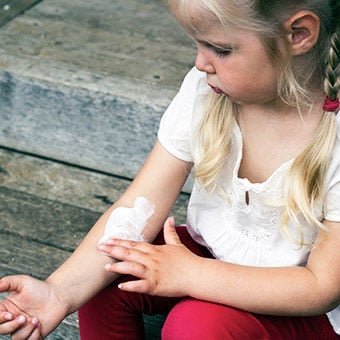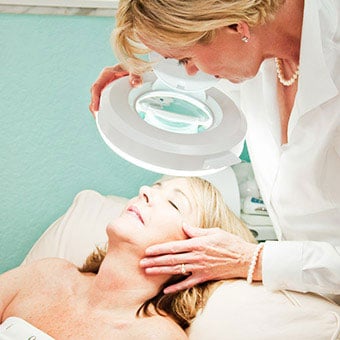Itch (Itching or Pruritus)
- Facts
- Symptoms/Signs
- Causes
- Diagnosis
- Specialists
- Should You Scratch?
- Treatment
- Remedies
- Medications
- Prevention
- Seeking Help
- Complications
- Prognosis
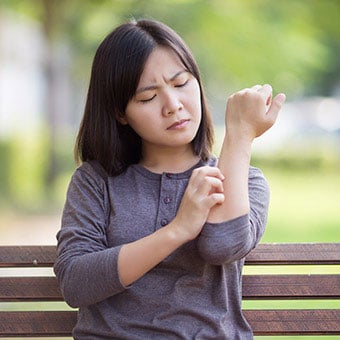
What facts should I know about itching?
- The medical term for itching is pruritus.
- Bacterial and fungal infections, bites and stings, infestations, chronic diseases, atopic dermatitis, psoriasis, allergic reactions, sun exposure, and dry skin, and other skin disorders and health conditions all may be causes of itching.
- Anti-itch creams and lotions containing camphor, menthol, phenol, pramoxine (Caladryl, Tronolane), diphenhydramine (Benadryl), or benzocaine can bring relief.
- Some cases of itching will respond to corticosteroid medications.
- It is important to avoid scratching when possible to prevent worsening of the condition and disruption of the skin that could lead to bacterial infection.
- If itching persists, worsens, or is associated with skin lesions, go see a health care professional.

What is an itch?
Itch is an irritation in the skin that elicits an urge to scratch. Itchiness is a problem that everyone experiences, and the symptom can be localized (limited to one area of the body) or generalized (occurring all over the body or in several different areas). Sometimes, depending upon the underlying cause, itching may be worse at night. In medical terminology, itching is known as pruritus.
Generalized itch that occurs all over the body is often more difficult to treat than localized itch. Itches can also occur with or without skin lesions (bumps, blisters, rash, redness, or abnormalities that can be seen on the skin). An itch that is accompanied by a visible skin abnormality should be evaluated by a physician and, in some cases, by a dermatologist since the problem is likely to be a condition that requires specialized medical treatment (for example, eczema, scabies, etc.).

What are associated symptoms and signs of itching (pruritus)?
Depending upon the underlying cause, itchiness may be associated with other symptoms and signs. Most commonly, these associated findings include skin lesions such as rash, blisters, bumps, or redness of the affected area. Dryness of the skin is a common cause of itch. Itching of skin can lead to tears in the skin (excoriations) from scratching. Less commonly, generalized itching all over the body can be a sign of chronic medical conditions such as liver disease. In these situations, there may be no changes to the appearance of the skin.

What causes itching?
Pruritus can be caused by many conditions. Stress, anxiety, or other emotional problems can cause itching. Stress also can aggravate itch from other causes. Dry skin (xerosis) is perhaps the most frequent cause of itch without a rash. Many people also report sunburn itch following prolonged exposure to UV radiation from the sun along with the pain of sunburn. Other causes of generalized itching that may not produce a rash or specific skin changes include metabolic and hormone disorders (for examples, kidney disease, hyperthyroidism), cancers (for example, lymphoma), reactions to drugs, interruptions in bile flow (cholestasis) from liver disease, and diseases of the blood (for example, polycythemia rubra vera). Itching is common with allergic reactions, such as food allergies or other types of allergy. Itching can also result from insect stings and bites such as mosquito or flea bites.
Psoriasis is a chronic cause of skin inflammation that can also be associated with itching. Patients with psoriasis typically develop red, elevated, scaling plaques of dry, itchy skin. Atopic dermatitis is a chronic inflammatory disease of the skin that usually starts in childhood. Itching, rash, and thickening of the skin over time are characteristic symptoms of atopic dermatitis. This is considered to be a type of allergy (an immune system reaction against a foreign substance) that is associated with inhaled allergies (hay fever) and is chronic.
Infections and infestations of the skin are another cause of itch. Genital itching or anal itching, which may accompany burning and pain, in men and women can occur as a result of genital infections such as sexually transmitted diseases (STDs). Vaginal itching is sometimes referred to as feminine itching, and sexually transmitted diseases can also cause anal itching and pain. Vaginal yeast infections are another cause of vaginal itching. Other common infectious causes of itch include a yeast (fungal) infection of the crotch (tinea cruris) commonly known as jock itch, psoriasis, and ringworm of the body (tinea corporis). Another type of parasitic infection resulting in an itchy sensation is the so-called swimmer's itch. Swimmer's itch, also called cercarial dermatitis, is a skin rash caused by an allergic reaction to infection with certain parasites of birds and mammals that are released from infected snails in fresh and saltwater. Itch may also result from skin infestation by body lice, including head lice and pubic lice. Scabies is a highly contagious skin condition caused by an infestation by the itch mite Sarcoptes scabiei that is known to cause an intense itch that is particularly severe at night.
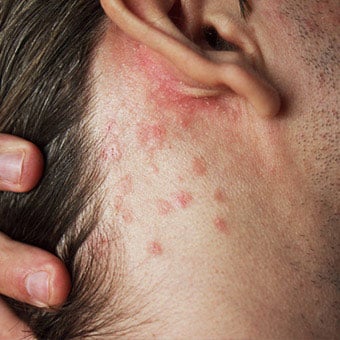
What causes itching? (Continued)
Brachioradial pruritus is a neurologic condition that results in intense itching of the arms. It usually develops on the forearm over the head of the brachioradialis muscle, but it can occur anywhere on the upper extremities. This is often caused by a pinched nerve in the neck.
Itching can also result from other conditions that affect the nerves or nervous system, such as diabetes, shingles (herpes zoster), or multiple sclerosis.
Irritation of the skin from contact with fabrics, cosmetics, or other substances can lead to itching that may be accompanied by rash, known as contact dermatitis. Poison ivy is another example of contact dermatitis. Reactions to drugs or medications can also result in widespread itching that may be accompanied by a rash or hives. Sometimes women report that they experience generalized itching during pregnancy or a worsening of the conditions that normally cause itching. Contact dermatitis from poison ivy, poison oak, or poison sumac (due to contact with the oily sap urushiol) or allergy to nickel are also common causes of localized itching.
Itching of the scalp can be caused by a number of conditions, including dandruff, psoriasis, or seborrheic dermatitis.
Most people who have itching do not have a serious underlying condition.

How do health care professionals diagnose itching?
As with any condition, a careful medical history and physical examination will suggest to your health care provider the particular diagnostic tests that may be needed to learn the cause of itching. Some common causes like dry skin or sunburn may be obvious, while causes such as chronic systemic diseases or conditions may require blood or imaging tests to identify. If a skin condition is responsible for the itch, sometimes a scraping or biopsy may be performed to identify the condition. Nevertheless, many common rashes and skin ailments have a characteristic symptom or appearance that may suggest the correct diagnosis.
What types of health care specialists treat itching?
Because the causes of pruritic skin are so varied, many different medical practitioners can be involved in treating itching. Itching is commonly treated by specialists in family medicine, internal medicine, pediatrics, or dermatology. Itching related to allergy may be treated by an allergist or immunologist. Itching related to STDs may be managed by a gynecologist or urologist. An obstetrician-gynecologist may treat women suffering from itching during pregnancy or vaginitis. People with itching due to chronic diseases may be treated by the specialists who manage these conditions, such as endocrinologists, gastroenterologists, nephrologists, oncologists, hematologists, neurologists, and infectious-disease specialists. Some causes of itching are treated by emergency-medicine specialists.

Should people scratch the itch?
Itching usually prompts scratching, which can sometimes lead to a vicious itch-scratch cycle. Scratching can initially feel satisfying, but prolonged scratching just leaves you with irritated skin that can still itch and often worsens the itching itself. Since scratching provides only temporary relief and doesn't promote healing of the underlying problem, it is best to avoid scratching if at all possible. If scratching breaks open the skin, bacterial infection can set in. This is known as secondary infection. And if scratching continues for many months or years, the area that is scratched may develop thickened skin (lichenification) or pigmentation that darkens the area.
The best way to allow irritated skin to heal is to stop scratching it. However, willpower often is not enough since the urge to scratch can be compelling. The following sections discuss some general measures and home remedies to help to stop scratching and control itch, regardless of the cause.
What are topical itch treatments? Are there any home remedies for itching?
Topical itch treatments, those used on the skin, include cold applications, creams, and lotions.
Cold applications: Because cold and itch travel along the same nerve fibers, the use of cold can "jam the circuits" and deaden itch. Methods of applying cold include the following:
- Cool water, either by running tap water over the affected area or placing a cold clean washcloth on the skin
- Cool showers
- A cool bath; products that contain colloidal oatmeal are available over the counter as an itch relief bath
- Ice packs, either the commercially available type or ice cubes in a plastic bag
Hot water (in the shower, for instance) feels good temporarily, but it can leave you feeling even itchier later. Therefore, the use of hot water is not recommended.

What are topical itch treatments? Are there any home remedies for itching? (Continued)
- Camphor
- Menthol
- Phenol
- Pramoxine
- Diphenhydramine (Benadryl)
- Benzocaine (or one of the other "caine" anesthetics)
You can apply these products over and over, every few minutes if needed. These preparations help numb the nerve endings and stop you from a frenzy of scratching, which leaves the skin raw, sore, and even itchier.
Although hydrocortisone-containing creams and lotions are often promoted as itch reducers, this ingredient only helps an itch that is caused by a rash responsive to cortisone, such as the skin diseases eczema and seborrhea. Since OTC hydrocortisone-containing creams and lotions are weak (even so-called "maximum-strength" products contain only 1%), they aren't too helpful for itch even in responsive conditions. When pruritus is caused by irritations of other sorts (insect bites, for instance), hydrocortisone doesn't help much at all. If you use hydrocortisone for 10 days and experience no improvement, you should go see a physician to help determine the cause of your itch.
Learn more about: hydrocortisone

What are oral medications that treat itch?
Traditionally, antihistamines are used to treat itch. Examples include diphenhydramine (Benadryl), hydroxyzine (Atarax), and chlorpheniramine (Chlor-Trimeton and others). These medicines can induce drowsiness in many people and must be used with care before driving a car or operating heavy machinery. Although antihistamines may help relieve itchy skin, they seem to do so mainly by helping people fall asleep and avoid scratching at night. If falling or staying asleep is not your main problem, you may want to try one of the nonsedating antihistamines. Loratadine (Claritin) and fexofenadine (Allegra and others) are examples of newer second-generation antihistamines that are available without a prescription. The second-generation antihistamines do not have the sedating effects of the older first-generation antihistamines but they are not very effective in quelling the itch.
Learn more about: Benadryl | Atarax | Chlor-Trimeton

Is it possible to prevent itching?
Itching can be prevented only to the extent that the underlying cause(s) of the itching sensation can be prevented. For example, careful use of sunscreen products can prevent the itching associated with sunburn. Keeping well hydrated and using moisturizers can prevent the itch associated with dry skin. It is also possible to take preventive measures to avoid contagious conditions that may be transmitted by skin-to-skin contact like sexually transmitted diseases, or tick or bug bites, or lice infestations that may be the sources of itching. Chronic itch associated with serious conditions like skin cancers and liver or kidney disease cannot typically be prevented.
Learn more about: Benadryl | Atarax | Chlor-Trimeton
When should the doctor be consulted for itching (pruritus)?
If home treatment isn't helping, scratching is affecting the skin being scratched (infection, lichenification [thickening and scarring], or pigmentation), or the itch is disturbing one's sleep, consult a doctor to ascertain what's causing the itching. A doctor can also prescribe stronger cortisone-based creams (for eczemas and allergies) and prescription-grade antihistamines, if necessary, or treat the underlying condition that is causing the itch.
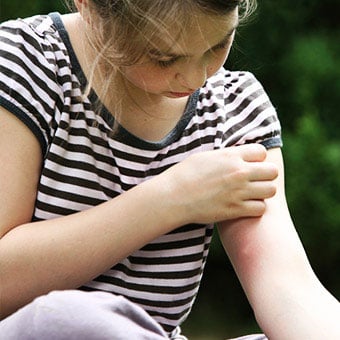
What are possible complications of itching?
As mentioned previously, a secondary bacterial infection of the skin is perhaps the most common complication of itching. This occurs not as a result of the itch but as a result of the scratching and associated skin damage. Antibiotics may be required to treat a bacterial infection of the skin. Itching itself is unlikely to lead to other complications, although some of the underlying diseases that cause itching (see above) are associated with complications specific to the disease itself.
What is the prognosis (outlook) for itching?
Itching itself is not associated with long-term skin problems or harm, and most cases of itch are temporary and resolve on their own or with topical or oral treatments. Itching that is associated with a serious condition may persist if the condition worsens or it may be managed with medications.

